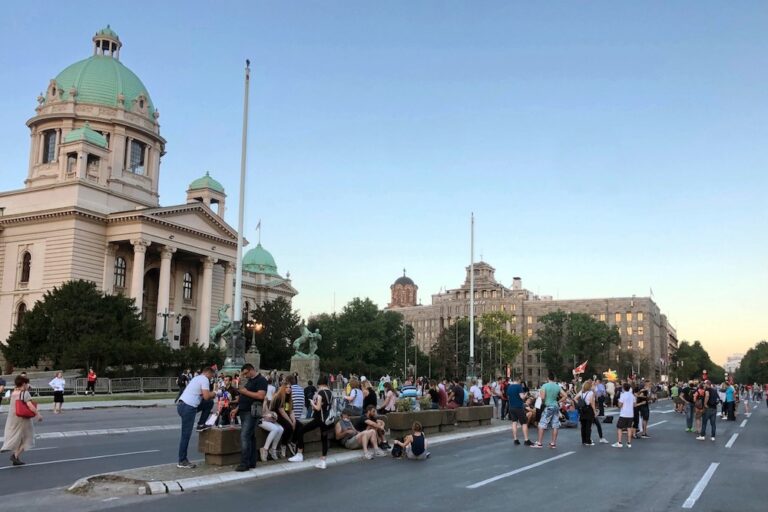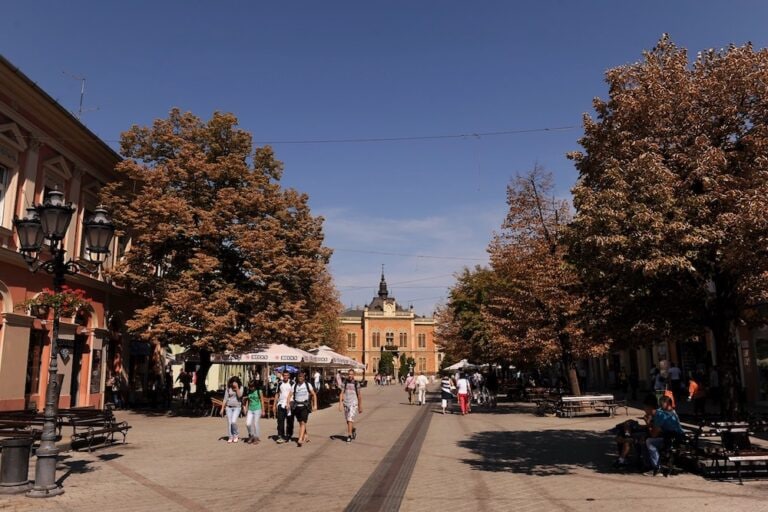(WAN/IFEX) – The following is a WAN press release: Paris, 12 April 1999 For immediate release Timely Report on Yugoslavia for Press Freedom Day Slobodan Milosevic, the strongman of Serbia, “has made a mockery out of the state, parliament, currency, judicial system, public interest and system of values,” the President of the Independent Journalists Association […]
(WAN/IFEX) – The following is a WAN press release:
Paris, 12 April 1999
For immediate release
Timely Report on Yugoslavia for Press Freedom Day
Slobodan Milosevic, the strongman of Serbia, “has made a mockery out
of the
state, parliament, currency, judicial system, public interest and
system of
values,” the President of the Independent Journalists Association of
Serbia
says.
In a timely essay entitled, “The Berlin Wall Still Stands in Serbia,”
Milos
Vasic tells how Milosevic “lost three wars in former Yugoslavia,
forfeited
all promises and commitments he made, and found himself facing his
fourth
military defeat – in Kosovo.”
Mr Vasic’s essay is included in a package of press freedom materials
sent by
the World Association of Newspapers to 15,000 newspapers world-wide
for
publication on 3 May, World Press Freedom Day. The package also
includes
essays by dissidents and editors, case studies on jailed journalists,
statistics about murders and other press freedom attacks, and
advertisements
highlighting press freedom.
Mr Vasic’s prescient essay, written before the beginning of the NATO
bombardment, focuses on how the Milosevic regime took control of the
most
important media in the country as he established his totalitarian
regime.
“The regime – and most opposition political parties, for that matter –
are
unable or unwilling to understand that freedom of the press is one of
the
basic infrastructural rules of the game in a democratic society,
something
like railways, electricity or telephone networks,” Vasic writes.
Vasic has been President of the Independent Journalists Association of
Serbia since 1997. He has worked as a broadcast and print journalist
since
1969, and has been published widely in leading European and US
newspapers.
Mr Vasic has reported on the war in former Yugoslavia since it began,
both
in the field and as a defense and political analyst.
Among the other contributors to WAN’s 1999 World Press Freedom Day
package
are:
Christina Anyanwu, writing about conditions in Nigeria, where she
served
three years in prison for “publishing false information” before her
release
in June 1998.
J. Jesus Blancornelas, a Mexican editor who was severely wounded by
gunmen
in November 1997. Mr Blancornelas was investigating drug trafficking
by the
mafia. He is the 1999 winner of the UNESCO/Guillermo Cano World Press
Freedom Prize.
Doan Viet Hoat, a Vietnamese journalist, poet and academic, who spent
20 of
the past 22 years in prison for exercising his right to free
expression.
After a concerted international campaign, he was released in August
1998 and
deported to the United States.
Faraj Sarkohi, an Iranian editor who has been persecuted by the
regimes of
both the Shah and the Islamic Republic. Mr Sarkohi, who has been
awarded the
1999 WAN Golden Pen of Freedom, was released from prison in 1998 and
lives
in exile in Germany.
The World Press Freedom Day materials are also available on the WAN
web site
at www.wan-press.org/wpfd99/. (Editors note: The materials can be
downloaded
from the web site or obtained from the WAN Secretariat. Due to
developments
in Yugoslavia, editors wishing to publish Mr Vasic’s essay before 3
May can
do so, providing it carries the statement that he contributed it to
the
World Association of Newspapers to commemorate World Press Freedom Day
on 3
May).
The Paris-based WAN, the global organisation for the newspaper
industry,
defends and promotes press freedom world-wide. It represents 15,000
newspapers; its membership includes 58 national newspaper
associations,
individual newspaper executives in 90 countries, 17 news agencies and
seven
regional press groups.


